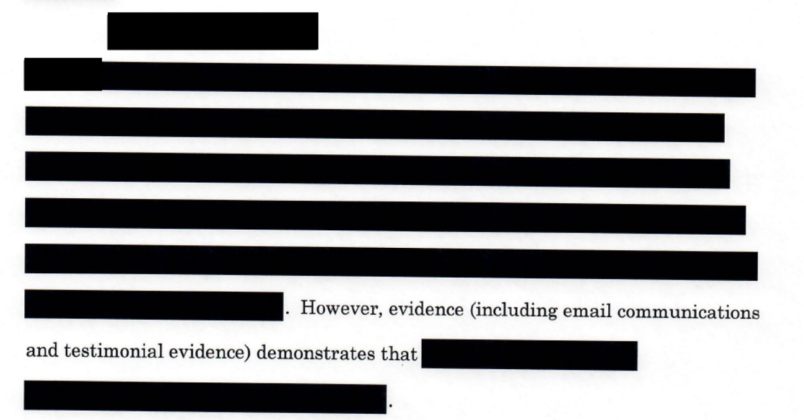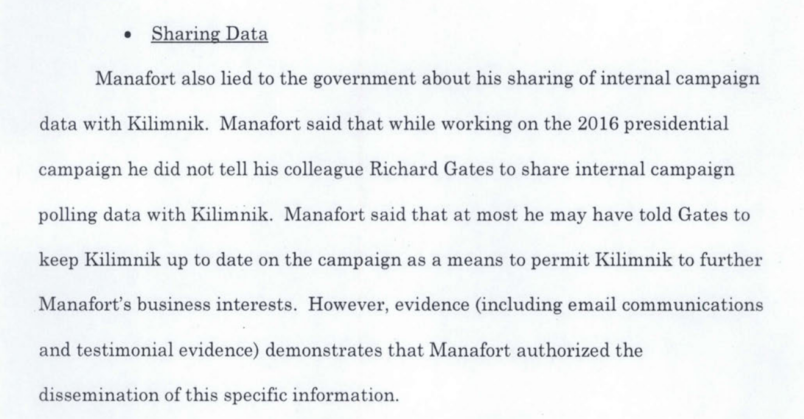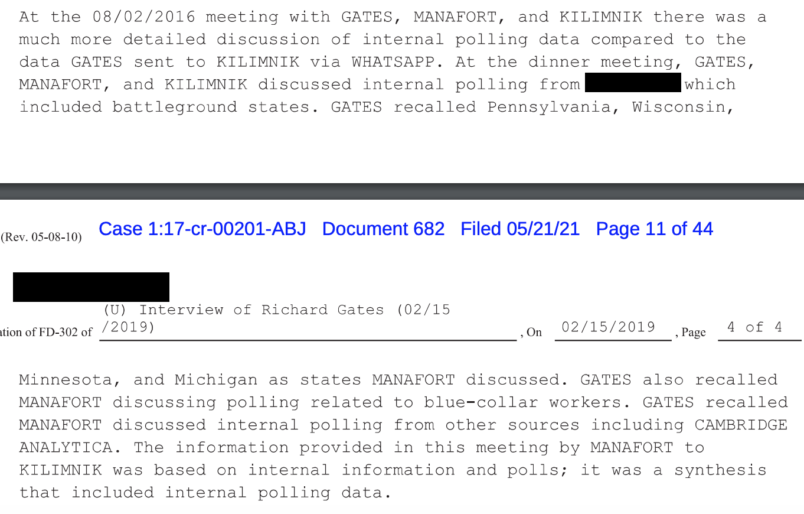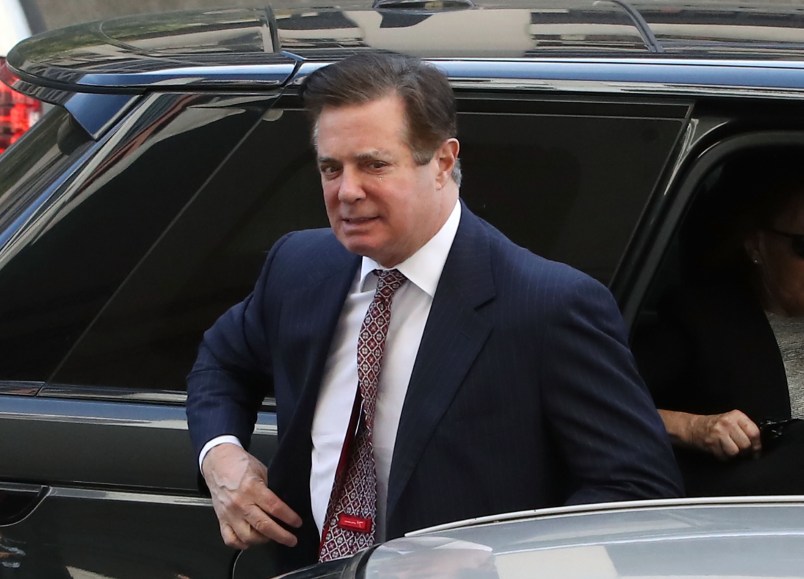The evidence that Special Counsel Robert Mueller had suggesting that Paul Manafort was sharing polling with a shady figure with links to Russian intelligence was more extensive than previously known, as revealed by documents unsealed Monday in Manafort’s case.
The freshly unsealed filings also provide new details about the critical August 2016 meeting at the Grand Havana Room, which occurred hours after Manafort allegedly asked his deputy, Richard Gates, to print out and bring detailed, internal Trump campaign polling data on the morning of the meeting.
While former President Trump and his allies have for years embraced a “no collusion” mantra about the Mueller investigation, the picture that Mueller ultimately presented was more complicated — with one of the biggest questions lingering around how Manafort, while leading Trump’s 2016 campaign, shared certain polling data with an enigmatic associate who the FBI describes as tied to Russian intelligence.
That associate, Konstantin Kilimnik, was recently sanctioned by the Biden administration, which said last month that Kilimnik had “provided the Russian Intelligence Services with sensitive information on polling and campaign strategy.”
Manafort’s lack of candor about his interactions with Kilimnik, including those that involved campaign polling, unraveled the cooperation deal he reached with Mueller’s probe. The documents released Monday revealed previously obscured aspects of that dispute, during which most of the information about the data sharing was heavily redacted. The documents include notes from an FBI interview with Gates discussing the data.
An Account From Gates Apparently Backed By Kilimnik Emails
When Mueller first accused Manafort of violating his plea deal by misleading investigators, it was kept out of public view how those allegations related to polling data that was shared with Kilimnik.
That section in a Mueller filing initially submitted in late 2018 was almost entirely redacted.

It did become public — accidentally — in early 2019 that Manafort’s account of campaign data sharing was an aspect of his dispute with Mueller over his candor; Manafort’s Jan. 2019 filing responding to Mueller’s allegations had a redaction error that allowed it to be seen that that was one of the things Mueller had accused him of.
But thanks to the documents unsealed Monday, we now have a fuller picture of what Mueller told Manafort’s judge about Manafort’s interactions with Kilimnik, who by then had been linked by Mueller to a Russian intelligence agency. Mueller accused Manafort of lying to the government about an instruction he gave Gates to share the data with Kilimnik.

Much of what Mueller had learned about the data sharing came from Gates, who pleaded guilty and started cooperating with Mueller’s probe in February 2018. Gates discussed with investigators during four different debriefings how he passed along the data to Kilimnik, according to one of the newly released Mueller filings. One of those debriefings happened in February 2019, after the claim inadvertently became public. Mueller told the court that Gates had been “consistent” in his account of “repeatedly” receiving instructions from Manafort to share the data.
FBI notes from the February 2019 interview with Gates show that prosecutors were interested in data that the Manafort deputy shared with Kilimnik, and how it might have also affected internal Trump campaign decision-making. Prosecutors showed Gates one piece of Trump campaign polling, though it’s unclear from the notes if it was passed along to Kilimnik.
Gates told prosecutors, the notes say, that the data was “strategically useful” for deciding where to send candidates.
”Manafort’s strategic decision of where to send Pence was based on that document,” interview notes read.
In addition to what Mueller’s team heard from Gates’ himself, Mueller also obtained eight emails where Kilimnik mentioned campaign polling data. The references popped up in Kilimnik emails sent starting in late July 2016 and through mid-August, according to the newly unsealed court documents. In seven of those emails, Kilimnik said he was referring to what Trump’s “internal polling” shows.
The Senate Intelligence Committee, which also purportedly obtained those communications, gave one example in its Russia probe report of how Kilimnik framed up what he had seen.
“Trump’s internal polling shows signs of strengthening of their positions among key target groups they care about,” Kilimnik wrote then.
Manafort Plays Down What Mueller Has On The Campaign Data Sharing
When Manafort responded to Mueller’s allegations, he stressed Gates’ supposed unreliability as a witness. Manafort also said that the Kilimnik emails didn’t prove what Mueller said they proved.
“These emails do not suggest Mr. Kilimnik ever received internal polling data; rather, they explain what he is hearing that the internal polls show strengthening in the candidate position,” according to a newly unsealed portion of a Manafort filing.
Manafort argued that another point in his favor was that Mueller hadn’t presented any Kilimnik emails that contained campaign data themselves.
“Importantly, while the OSC has obtained Mr. Kilimnik’s emails, it has not produced a single message showing he ever received any internal polling data,” Manafort said.
However, as the newly released Gates interview notes showed, Gates said he sent Kilimnik the polling on an encrypted messaging app and then promptly deleted the messages.

New details emerge about crucial Havana Cigar Room meeting
Much of Mueller’s focus at the time was directed towards an August 2016 meeting between Manafort, Gates, and Kilimnik at the Grand Havana Room, a Fifth Avenue cigar joint.
The filings show that on the morning of the meeting, Manafort told Gates to “Print out and bring to our SCh [sic] meeting.” Attached to that email, prosecutors said, was an Excel spreadsheet with 18 tabs, containing internal Trump campaign polling data.
While the Mueller prosecutors didn’t provide much more detail about exactly what data was in the spreadsheet, the Senate Intelligence Committee report said that it contained “historical polling data and internal Campaign polling data” for locales in 17 states.
Gates purportedly arrived late to the meeting with the alleged Russian intelligence officer, but once there, told the feds that he bore witness to a “detailed discussion of internal polling data.”

FBI notes show that Gates recalled Manafort discussing in particular how the polling related to “blue-collar workers” and that the data was a synthesis of internal and publicly available information.
The unredacted filings show how Manafort’s counsel used ambiguities in the special counsel’s investigation to argue that nothing untoward occurred at the Grand Havana Room.
Manafort said that it’s not clear that he wanted Gates to share the printout with Kilimnik, and that in the email prosecutors cite, the then-Trump campaign manager was referring to a separate meeting.
“There is nothing surprising about a campaign manager asking for a printout of data to use at a typical campaign related scheduling meeting with staff,” Manafort’s attorneys argued.
In another filing, Manafort’s attorneys pushed back hard, saying that the data printout was for an entirely different meeting.
“In fact, the 79 pages of polling information was printed in preparation for a campaign scheduling meeting and did not relate to the later meeting with Mr. Kilimnik,” they asserted.
Known unknowns
The filings leave many key questions about the events of summer 2016 unanswered.
Both the Mueller report and the Senate Intelligence Committee report note that Manafort and Kilimnik made extensive use of encrypted messaging applications, and would, as a matter of practice, delete messages.
“When they did communicate electronically, Manafort, Gates, and Kilimnik used a variety of encrypted applications, eliminating a documentary record of many communications that almost certainly would have had high investigative value,” the Senate report reads, listing a variety of practices that Manafort used to evade detection including keeping a laptop that he only used in Ukraine, and buying a pay-as-you-go phone to communicate with Kilimnik and Gates after Manafort was indicted. FBI interview notes also show that Gates told prosecutors that he would delete messages to Kilimnik as soon as they were sent.
All this leaves a yawning gap in what can be nailed down about how and what data was transferred, particularly with respect to the data that Kilimnik received. By all accounts, the actual data that was sent to Kilimnik on WhatsApp has disappeared, with only oblique references by the alleged Russian intelligence officer to what he learned remaining in the eight emails cited by the Mueller team.
In a sense, it’s the kind of uncertainty that deleting messages as a matter of course is designed to create: a veneer of plausible deniability, or at least enough murkiness to allow for spin.







Funny how January 6th kind of temporarily distracted us from the earlier T**** Treason Team.
Back at it, Mr. Garland.
Even Taylor Swift knew he was trouble when he walked in.
Kilimnik, the same guy as on the Sanctions List.
One question is how much Manafort was doing to benefit himself and how much he was doing to benefit the Orange Menace. However, we know Manafort had sufficient blackmail material to get a pardon out of Mar-a-Lardo.
The fact that this guy wasn’t in jail before the 2016 election speaks to the complete failure of our judicial system to take white collar crime seriously. Quick and easy wins, that’s the American way for the 21st century, god forbid we put in the work to tackle the serious issues plaguing our society.